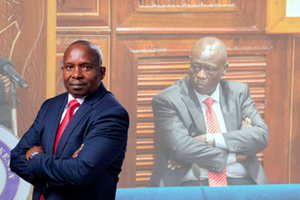Avert looming crisis in public universities

Officials of Universities Academic Staff Union and Kenya Universities Staff Union during a media briefing on October 15, 2024.
The recent strike notice issued by the Public University Workers Union, the Universities Academic Staff Union (Uasu) and the Kenya University Staff Union (Kusu) should not be taken lightly. The workers are justified in their frustration as the government has failed to honour the return-to-work formula signed on September 26, 2024, a deal that had momentarily averted a major crisis in the higher education sector.
The looming strike, set to begin in seven days, threatens to plunge public universities into chaos once again. Academic programmes will be halted, research will stagnate, and students will be left to bear the brunt of the ongoing stand-off. It is imperative to understand that these strikes are not simply about salary increments or better working conditions, they are about the government’s failure to honor its promises.
In September, after months of negotiations, Uasu and Kusu agreed to return to work based on the belief that the government would fulfil its side of the bargain. However, barely a month later, the unions once again compelled to issue a strike notice because the government has reneged on the agreed terms.
This breach of trust not only disrupts university operations but also undermines the confidence of university staff in future negotiations.
The consequences of another job boycott will be dire. Students who are already grappling with the economic pressures of rising fees, may face extended semesters, delayed graduations, and increased financial burdens.
In addition to these challenges, universities are also struggling with the implementation of a contentious funding model that has sparked widespread debate. These disruptions will ultimately take a toll on public universities, leading to a decline in the quality of education. Over time, public universities may lose their competitive edge to private institutions.
The government’s failure to implement a return-to-work agreement demonstrates a worrying trend in how it handles labour disputes within the education sector. This is not the first time public university workers have had to resort to having their voices heard. Repeated industrial action points to systemic issues in the government's approach to dialogue and fulfilment of commitments.
A healthy education system is key to the country’s socio-economic development, and the role of academic staff and university workers cannot be overstated. They are the backbone of our higher learning institutions. Failure to address their grievances in a timely manner sends a message that education is not being prioritised.
It is time the government takes decisive action to honour the agreement and provide long-term solutions to the challenges faced by the university workers. The return-to-work formula was not just a piece of paper, it was a commitment to the workers who keep our universities running.
Rose Murugi, Intern, Corporate Communications Office, Jomo Kenyatta University of Agriculture and Technology. [email protected]





